 By Christopher McKevitt, Auschwitz
By Christopher McKevitt, Auschwitz
At the airport gate-style security area on the way into Auschwitz, a woman is negotiating with several of the guards.
They are telling her very politely in very good English that she may not take a large handbag into the memorial site.
The reasons are obvious but the woman is insisting she must have her bag with her. The security guards politely suggest the left luggage office just outside.
She disagrees and tells them she is now worried the delay has caused her to become separated from the rest of her party.
The irony is not lost on those held up waiting behind her.
Just a few dozen metres away, beyond the Arbeit Macht Frei, sign are buildings housing millions of personal belongings, which SS men and women took from the men, women and children who arrived here between 1940 and 27 January 1945, when the Soviet army overran the place and freed around 7,000 people left inside.
The loot was piled ceiling high while the 1.1 million people who owned them had been reduced to ash in the crematoria 2km away in Auschwitz-Birkenau.
Note the date - Today is the 70th anniversary of the liberation of Auschwitz-Birkenau.
As in 1945, southern Poland is covered in snow this week as I visit the death camp.
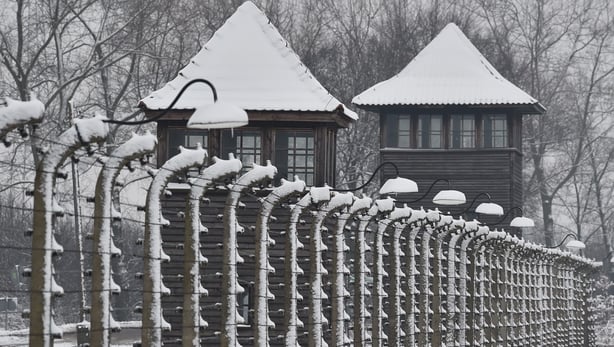
Just outside what seems to be a former SS barracks now converted to an administration building, Pavel Sawiski one of the press officers for Auschwitz explains that this special anniversary will focus on the survivors.
No politicians will make a speech during the formal part of the ceremony.
This time, the speeches will be from those who were once incarcerated here. And no one has any idea what they will say, he says.
Pavel tells me that at the 60th anniversary there were 1,500 survivors in attendance.
This year they are expecting 300.
So this anniversary is perhaps one of the few remaining times when the living witnesses to the greatest crime in history will gather in such a way to remind the rest of humanity how grotesquely warped a political ideology can become.
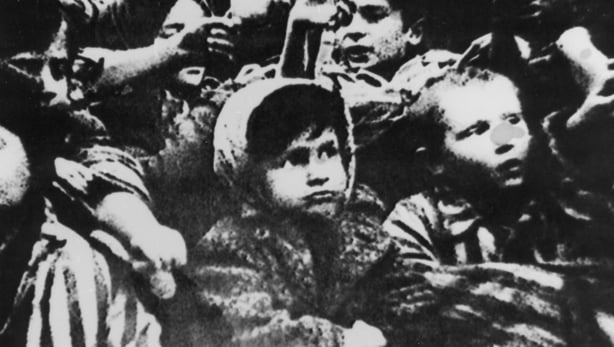 Picture of children in Auschwitz showing tattooed numbers on their arms after the liberation of the camp
Picture of children in Auschwitz showing tattooed numbers on their arms after the liberation of the camp
Auschwitz was built around a pre-World War II army barracks, large red brick buildings arranged in rows and inside many of them are museums to the communities the Nazis attacked.
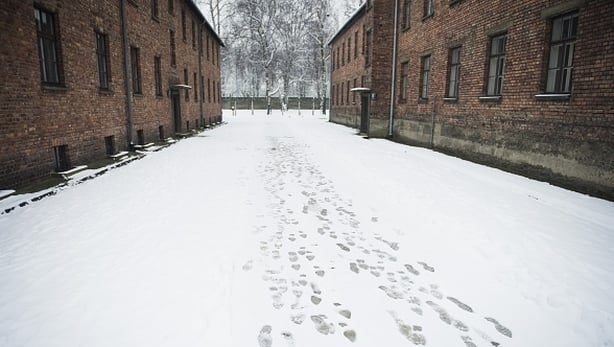
There is a new Jewish exhibition in Block 27 with a room illuminated with beautiful pictures of pre-war domesticity inside the French, Hungarian and Polish homes of people who later would be transported to the camp.
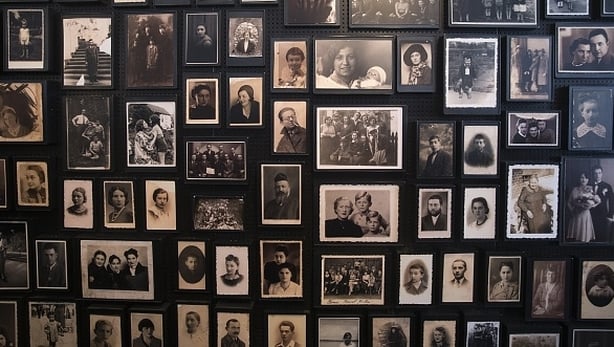
People smile from family photographs - many no doubt unaware they were about to be overwhelmed.
Block 15 holds the Polish exhibit, which is not for the faint-hearted.
Around 70,000 Polish people were murdered at Auschwitz, but the walls of the block are lined with pictures of Nazi executions as they stormed east towards Moscow executing Polish Jews as they advanced.
Block 13 memorialises the 20,000 or so Roma people murdered at Auschwitz and the dreadful things Dr Josef Mengele did to their children in his laboratories.
A short drive from there to Auschwitz-Birkenau and there is no access. I had to take the scenic route and compete with vast numbers of tourist coaches down a narrow road in a snow storm.
A giant white marquee has been built around much of the "Gate of Death". Under the canvas, preparations were ongoing to receive the attending government representatives.
 The women's barrack at Auschwitz
The women's barrack at Auschwitz
Minister for Foreign Affairs Charlie Flanagan will represent Ireland. Ukraine's president will be there, as of course will Poland's.
The Supreme Commander in Chief of Russia's military will not.
Vladimir Putin will not be there because of a protocol dispute best understood in the context of the battle for eastern Ukraine.
Auschwitz-Birkenau is a vast camp and much of it is demolished.
Some of the barracks are open and you can see the bunks where prisoners slept when not being worked to death.
At the far end are the remains of two long rectangular gas chambers, brick pits sunk into the earth.
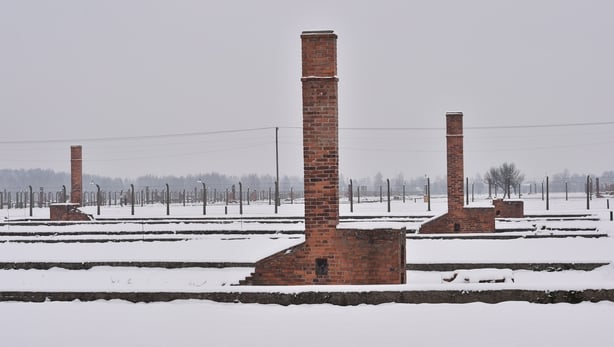
Adjacent to them are the buildings that housed the ovens used to burn the evidence.
They were blown up by the Nazis before the Soviets arrived. Much of Auschwitz-Birkenau is reduced to foundation level, but the imprint of the buildings is there and today, the site will be bathed in light under the dark Polish sky.
Next to the snow covered ruins of Cremetoria II, I introduced myself to a man from New York called Alex Heght. He tells me his mother from Romania is not here. She survived Auschwitz.
She was deported in 1944 when the exterminations were at their peak.
She was 16 in Auschwitz and today lives in New York.
Her younger brother and sister both perished as did many others from Mr Heght's extended family. Mr Heght devotes much of his energies to educating people about the Holocaust.
He gives me a pamphlet that describes his work for the Jewish Architectural Heritage Foundation.
The organisation turned a vacant synagogue in northern Transylvania in Romania into a holocaust memorial.
It was the synagogue he attended as a child before his family emigrated to New York.
Abandoned in 1964 as the Jewish community emigrated, it was due to be turned into a discotheque. (www.mmhtn.org)
Back at Auschwitz the gates are closing to visitors but members of the official French delegation, led by the mayor of Paris, arrive for a visit and to lay a wreath to the 69,000 Jews deported from France during the Holocaust, rounded up and dispatched by Gendarmes rather than the SS who ran the persecution as it evolved into the 'Final Solution to the Jewish Question'.
Among them is the wealthy financier Eric de Rothschild, who is chairman of the Shoah Memorial in Paris.
He agrees to an interview as his party moves around the site. I ask him following the attacks in Paris how confident he feels.
He says in certain areas, Jews feel "menaced" and wonders if they have a future for their children in France.
He says despite political reassurances that France without its Jews would not be France but nevertheless, there are Jews who do not feel welcome.
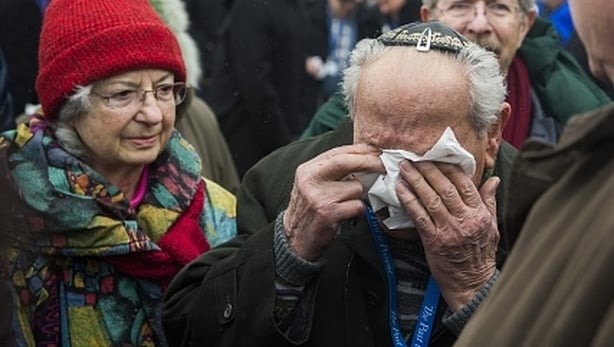 Holocaust survivor Mordechai Ronen is overcome by emotion as he arrives at Auschwitz for the 70th anniversary
Holocaust survivor Mordechai Ronen is overcome by emotion as he arrives at Auschwitz for the 70th anniversary
The people who will speak today are all in their 80s now.
Many were children then, of the 230,000 children deported to the camp, just 700 emerged. Of course the SS had no intention of leaving them alive.
They had orders to leave no witnesses, but in their panic to flee the Soviet advance, they did not have time to murder them.
Today we will hear from the last witnesses to the one of the greatest crimes in human history.

